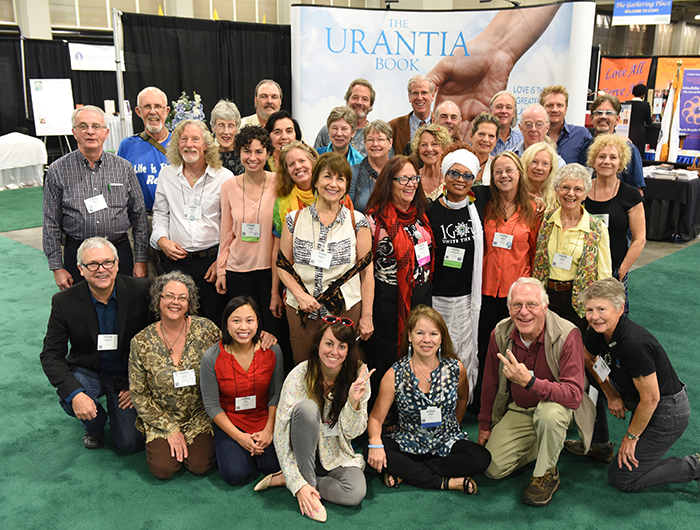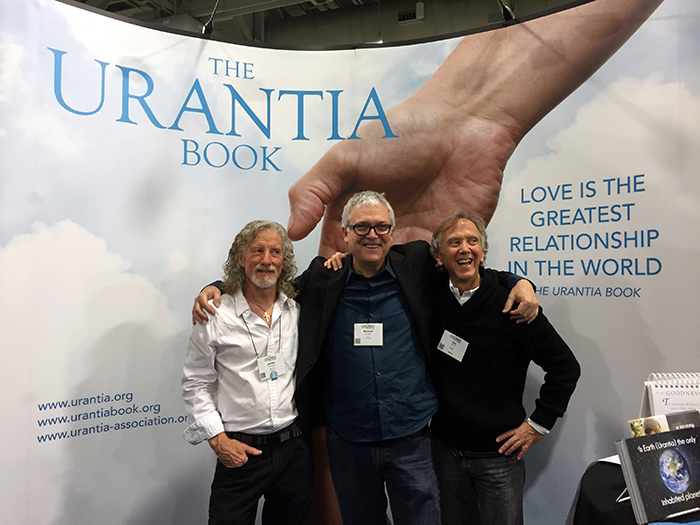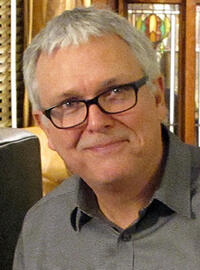The Urantia Book at the Parliament of the World’s Religions
The Urantia Book at the Parliament of the World’s Religions
By Richard Jernigan, associate trustee, Texas, United States
Over nine thousand registered participants attended the Parliament of the World’s Religions held October 15–19, 2015, in Salt Lake City, Utah.
This event, held approximately every five years, is an international gathering of religionists representing a multiplicity of faith traditions and belief systems.
At moments it was overwhelming. This is one place I could assume with certainty that everyone attending was consciously pursuing a spiritual path. It is an extraordinary sensation, sort of like waking up in the next life, and everyone is in a big melting pot of multiple spiritual and religious experiences, and they are sorting it all out and connecting.
The first Parliament was held in Chicago in 1893. The second Parliament was held one hundred years later in Chicago in 1993. Since then, the Parliament has been held every five or six years and in different countries. Urantia Book readers have attended and promoted the text at every Parliament since the one held in 1993 in Chicago.
For this Parliament, the three major organizations, Urantia Association International (UAI), The Urantia Book Fellowship, and Urantia Foundation, agreed to jointly share a booth to promote The Urantia Book.
Presenting this unified voice at the Parliament was sometimes difficult for the three organizations. Each group operates with slightly different philosophies, purposes, and sensibilities. At the forefront of this effort were Cristina Seaborn, representing the Fellowship, and James Woodward of UAI. Joanne Strobel and I alternated as representatives of the Foundation. Determining the banner and its messaging, agreeing on promotional materials, deciding which book versions to display, and multiple other issues were debated and agreed upon over several months. In the end, every promotional item had the web addresses of the three organizations and the focus was unerringly on the book, not the organizations. An eight-foot-high banner featured the book’s name in large letters, a simple image of a child’s hand reaching up to grasp an adult hand, and the message “Love Is the Greatest Relationship in the World.” 143:6.4 (1615.5)
As the three organizations came together with one voice, three other booths fostered the book’s teachings. The Fellowship-supported Youth and Young Adults (YaYAs) sponsored a Spiritual Unity booth to promote interfaith dialogue. Ben Bowler and Pato Banton presented the 1God.com booth, and Tom Choquette and Susan Cook sponsored their “I Will Love” booth. Each booth added richness to the presence of The Urantia Book at the Parliament, and hosts sent numerous interested individuals over to the Urantia Book booth to purchase the text or gather further information.
Our booth was a corner space in a visible, high-traffic area. Practically anyone perusing the exhibitors’ area passed by, and inquirers were continually at the booth. We sold or gave away nearly 120 books and hundreds of postcards and pamphlets. We had no shortage of hosts at the booth, as approximately 120 Urantia Book readers registered and attended the event.
It was our combined mission to listen to attendees’ stories and backgrounds and initiate awareness of the book. This was not a proselytizing mission but an awareness campaign to let people know this text is available.
In addition to the booths, six workshops featured Urantia Book readers. Presenters submitted applications nearly a year in advance; a Parliament committee approved or rejected applicants; and over six hundred workshops were chosen. Angie Thurston gave a talk on “Engaging the Religious Unaffiliated at Harvard Divinity School and Mobilizing Interfaith Leaders.” Tom Choquette and Susan Cook presented “I Will Love: Tapping into the Power Within.” Meredith and David Tenney offered “Exploring Divine Patterns of Male/Female Partnership.” Stevie Shaefer discussed “Building Interfaith and Interreligious Empathy.” Gard Jameson led a panel on “Non-Traditional Jesus on War, Violence, and Injustice.” Jeffrey Wattles presented “In Pursuit of World Peace: How Philosophy Mediates Between Religion and Politics.”
The theme of the Parliament was “Reclaiming the Heart of Our Humanity.” The event’s tone was established by its focus on critical social issues: climate change and care for creation; income inequity and wasteful consumption; and war, violence, and hate speech.
Parliament attendees tended to be individuals with a high tolerance for interacting with an intense cross-section of paths and belief systems―certainly a Urantia Book-friendly event. But on a broader scale, the Parliament was not totally representative of the world’s religions. Conservative faith traditions tended to stay away. Mainline Christianity seemed under-represented. Reformed and Conservative Jews were in attendance, but Orthodox Jews seemed to be missing. The exception to this was the significant presence of the Church of Jesus Christ of Latter-Day Saints (LDS). Cities bid to host the Parliament, much as cities do to host the Olympics. Being in Salt Lake City, the Mormons played a noticeable role throughout the five days.
Overall, there was a decidedly left-of-center thrust to the discourse, which meant that sometimes there was a certain “preaching to the choir” and lack of vigorous debate. For an event of this scope more wide-ranging points of view could have deepened intergroup dialogue and brought greater relevance to the Parliament’s purposes.
Many outstanding thinkers in the world of religion and social causes spoke at the event’s plenaries, including Dr. Karen Armstrong, Brian McLaren, Dr. Jane Goodall, Michael Beckwith, Marianne Williamson, and dozens more. The Dalai Lama was slated to appear but cancelled his attendance due to health concerns.
Personally, I found it a delight to have interactions with multiple spiritual paths. The Sikhs daily provided all attendees a gourmet-quality vegetarian lunch. Called Langar, it is a free service they provide daily in their respective countries to all people, regardless of their station in life. To demonstrate everyone’s spiritual equality at this meal, guests remove their shoes, cover their heads, and are seated on the floor community-style as attendants serve (and serve and serve―it is all-you-can eat). I attended the Friday morning women’s plenary which inspired me to attend workshops and meet Sikh social activist Valarie Kaur and Native American Grandmother Mary Lyons. I received a smudging from Native Americans tending a sacred fire outside the convention center and met and spoke with a female ordained Catholic priest (yes, you read that right).
Months ago, at a meeting with members of the Urantia Association of the United States (UAUS) to discuss the Parliament, UAI president, Chris Wood, commented that “people do not attend the Parliament of World’s Religions to get a new religion.” His statement echoed in me throughout our preparations and while I attended the Parliament. People attend for multiple reasons, but one can assume that all attendees have defined their paths.
Our presence at the Parliament was an opportunity to be part of the dialogue, to make our presence known, and to be a supportive participant within the greater community of religionists.
An hour before I left …to catch my flight home, a small group of folk musicians performed in one of the main foyers surrounded by a group of fifty participants moving in a slow circle dance around them. This seemed to be an impromptu happening following a concert. In the midst of this was one of the Mormon elders, in a suit and black tie, enthusiastically singing and participating with the group. He stood out, and this was the type of behavior I had hoped to observe at the Parliament: individual religionists, who rarely have an opportunity to interact and who would typically be at odds with one another interacting, reclaiming the heart of their humanity—if even for a moment.

Urantia Book readers at the Parliament of the World’s Religions (Photo by Steve Rohrbach)

James Woodward, Richard Jernigan, and Guy Perron
